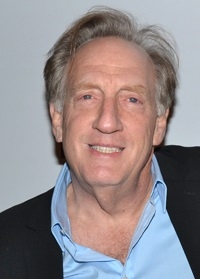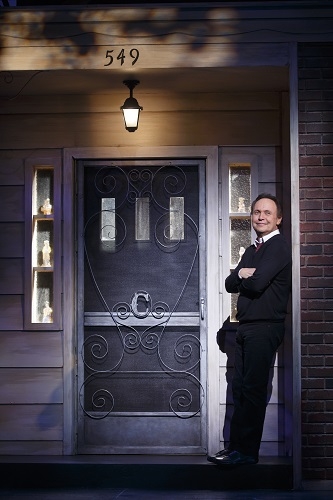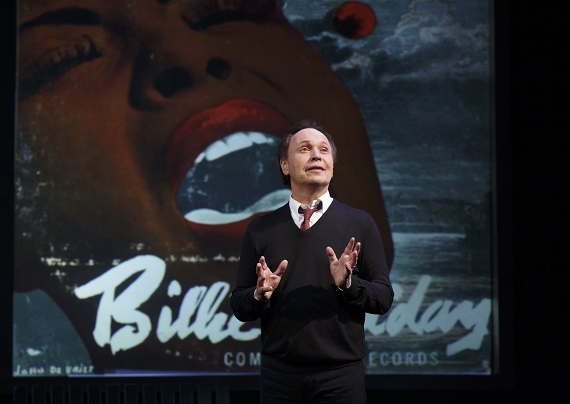Alan Zweibel: The Silent Voice of 700 Sundays
An everyman writer of all things comedic, Zweibel chats about collaborating with Billy Crystal on the hit Broadway play.

(© David Gordon)
Alan Zweibel has lent his voice and writing to the projects of some of the funniest players around. Steve Carell, Martin Short, Gary Shandling, Jon Lovitz, Gilda Radner, Steve Martin, Tony Shalhoub, Rob Reiner, Larry David, and David Letterman are just a few of the names that adorn his extensive curriculum vitae. A funnyman in his own right, the original Saturday Night Live writer is an acclaimed novelist (Lunatics, The Other Shulman), playwright (Fame Becomes Me with Martin Short, Bunny Bunny, Gilda Live), television writer (Monk, Curb Your Enthusiasm, Late Show With David Letterman), and producer (Showtime’s Inside Comedy, It’s Garry Shandling’s Show). Zweibel is currently represented in the New York theater community with Broadway’s 700 Sundays, a show that he holds close to his heart due to the fact that the play is a collaboration with one of his oldest friends, Billy Crystal. Zweibel spoke with TheaterMania about working with his three kids’ “uncle” Billy, the road to becoming a humorist and writer, and the lifelong challenge that has become styling his hair.
How did your friendship with Billy Crystal begin?
I’ve known Billy since 1974. We both started out together at the clubs in New York. I wanted to be a writer and he was doing stand-up. That was when Lorne Michaels came in and liked my material enough to give me a job as one of the original writers on SNL. But Billy became one of my best friends.
Much of your writing is completely original, but with 700 Sundays you took Billy’s stories and helped to turn them into one cohesive, funny show. Is it a greater challenge to use his stories to write, or is it easier than coming up with your own material?
It’s a combination of the two. It’s Billy’s story, so I had to adjust myself to his voice and those characters, most of whom I’ve never met. His family was very much like mine, and very much like everybody’s. That’s why people have taken to the show so well; it’s very relatable. Obviously I had to do it within the parameters of his family, but I was honored that he asked me to do it. He basically trusted me with his life. I took that very seriously. It makes you laugh, it makes you cry, and it makes you call people who are near and dear to you to tell them that you love them and bring them to the show.
Which of the characters or events in his life were you personally able to relate to the most?
His grandparents. My grandparents were immigrants, just as his were. Having come over from Europe, they were not at all dissimilar in the way they spoke and in their views of life. That was very relatable. Different uncles of mine also had their own little quirks, and there was a lot of extended family stuff.

(© Carol Rosegg)
What is the best part of working with Billy? What is the most challenging part?
It’s hard work, but it’s fun. We both have a sense of what we want to say and how we want to say it. He and I are very similar in what makes us laugh, but we also have a strong similarity as to emotionality and what makes you feel, and senses of loss, family, loyalties, and embracing people [whom] you love even with their idiosyncrasies and foibles. The hard part was that we’re both perfectionists. It has nothing to do with a difference in approach or personality. I’ve been writing for people long enough to know that it has got to feel comfortable coming out of their mouths, especially when you’re doing something [that] is first person and is so near and dear to you. That was an adjustment I made on day one, so there was no difficult part that way. This is a show that we’ve done before, but I was also at the show a couple of nights ago, and the next morning I sent him ideas for new jokes and tweaks. The show is up and running and selling out! Yet the two of us are always trying our best to make it better — even though it’s great. He’ll write to me and say, “I tried this tonight, what do you think?” and we’ll riff on it a bit. Or in a couple of places there are some topical jokes, and he’ll say, “What about this? What about that?” The dialogue just continues. The creative process doesn’t stop.
You said that you always wanted to be a writer. When did you first realize that was what you wanted to do as a profession?
When I was twelve years old. On The Dick Van Dyke Show Van Dyke played a comedy writer, and it looked really fun. He had a beautiful wife and a kid, a really nice house, and he joked around all day. So I went, Okay, I’d like to do that.
Part of what makes your writing so funny is that you sometimes take on topics that others wouldn’t necessarily approach. For example, in your novel Lunatics you wrote about farting and diarrhea. Were you the class clown or a prankster as a kid?
No, I wasn’t a class clown, I just found at an early age that I was able to make people laugh. So I mostly wrote funny stuff instead of writing what I was supposed to be writing. I was assigned something serious, and I couldn’t take a lot of it seriously. I didn’t do stupid pranks. I didn’t take off my clothes and run into the chemistry lab. I took creative writing classes and I was supposed to write poems; I wrote sketches.
If you could choose anyone to add to that great list of funny people with whom you have worked, who would it be?
I think Josh Gad [recently of Broadway’s The Book of Mormon] is a major talent. I’m looking forward to writing for him someday. Years ago he starred in the play that I had written about me and Gilda Radner, Bunny Bunny, and he told me that he actually played me in it. I’m creating a TV show for Whoopi Goldberg, so I’m looking forward to writing for her. I’ve been very lucky. I’ve written for most of my idols and the contemporaries. Steve Carell is supposed to play one of the leads in the movie version of Lunatics, I can’t wait for that.
If you were going to do a solo show based on your life, what do you think you would focus on?
I don’t even know that I would do it. I experimented with my own one-man show a couple of years ago in Aspen when HBO used to have their comedy festival there. I called it A History of Me. It was just my life story, but I’m not sure that I want to write about myself again, or if I’m ready to do it. I put myself into the characters that I write about. Bunny Bunny was about me, and that was as close as I came to it. That ran off-Broadway for quite a while. I’m pretty interested in my parents’ generation in 2013, not when Billy talks about it from when he was a child. I have a trilogy that I’m writing that is three one-acts all about Boca Raton called The Boca Collection. It’s sort of about me because it’s about that generation but it’s from my perspective. I’d rather speak through my characters.
Does it make you feel uncomfortable to write about yourself?
Not at all! But I would rather have characters that fascinate me and get inside of them. When I collaborated with Billy on 700 Sundays I was writing for characters I knew because they were just like my family. With Bunny Bunny (which is actually opening in Los Angeles next month amidst talk of a movie version), it makes me a little squeamish to have somebody up there with my name. There’s somebody on stage playing Alan Zweibel! (laughs) I find it more interesting to get inside of a character where I can look at their life and see what makes them tick, or create a character based on people I’ve met and speak from within their personas. Right now I just want to lose myself inside of others.
Because you’re not going to write about yourself anytime soon, what big secret would have been revealed about you if you ever did write about yourself again?
I’m still trying to figure out how to comb my hair. I haven’t found a hairstyle yet that I’m really comfortable with.

(© Carol Rosegg)









